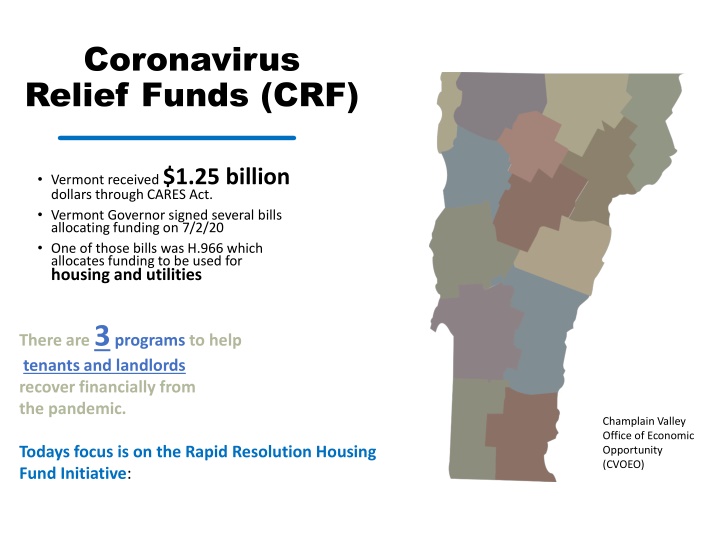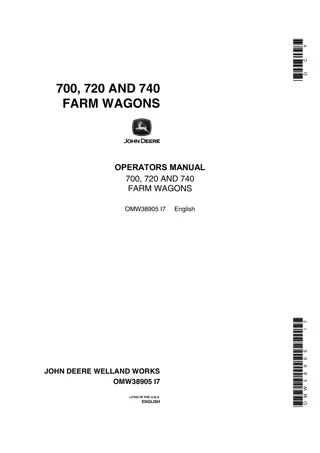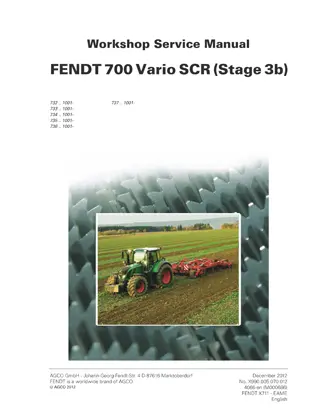
Financial Assistance for Housing & Utilities in Vermont
Explore the Rapid Resolution Housing Initiative in Vermont, part of the Coronavirus Relief Funds allocation, assisting households affected by the pandemic with flexible financial aid for housing needs. Eligible activities include rental assistance, security deposits, transportation costs, and more. Learn how this initiative aims to reduce homelessness in the region.
Download Presentation

Please find below an Image/Link to download the presentation.
The content on the website is provided AS IS for your information and personal use only. It may not be sold, licensed, or shared on other websites without obtaining consent from the author. If you encounter any issues during the download, it is possible that the publisher has removed the file from their server.
You are allowed to download the files provided on this website for personal or commercial use, subject to the condition that they are used lawfully. All files are the property of their respective owners.
The content on the website is provided AS IS for your information and personal use only. It may not be sold, licensed, or shared on other websites without obtaining consent from the author.
E N D
Presentation Transcript
Coronavirus Relief Funds (CRF) Vermont received $1.25 billion dollars through CARES Act. Vermont Governor signed several bills allocating funding on 7/2/20 One of those bills was H.966 which allocates funding to be used for housing and utilities There are 3 programs to help tenants and landlords recover financially from the pandemic. Champlain Valley Office of Economic Opportunity (CVOEO) Todays focus is on the Rapid Resolution Housing Fund Initiative:
1. . Rapid Resolution Housing Initiative Will help new tenants made homeless by the pandemic find stable housing. 2. 3. The Rental Housing Stabilization Fund Will help pay the rent arrearages that currently housed tenants accrued as a result of the pandemic. The Re-Housing Recovery Fund Will make available grants to landlords of up to $30,000 to help them bring blighted, vacant, or otherwise not in compliance units back on the market.
Todays Focus Rapid Resolution Housing Initiative The COVID 19 Rapid Resolution Housing Initiative (RRHI) is administered by the State Office of Economic Opportunity (OEO) to help local Homeless Continuum of Care partners to reduce homelessness, particularly in motels, by providing one-time/short-term flexible financial assistance to help households exit quickly to safe housing. The Rapid Resolution Housing Funds are focused on meeting the immediate financial needs of individuals and families experiencing homelessness currently due to the COVID-19 public health crisis. Funds are managed by in Franklin, Grand Isle, Chittenden, and Addison Counties.
Rapid Resolution Housing Initiative One-time/short-term flexible financial assistance to help households overcome financial barriers to exit quickly to safe housing and achieve their housing goals. Rapid Resolution financial assistance of up to $3,500 per eligible households for allowable activities, so long as eligible applicants have submitted a complete application package and funding is available under this grant agreement. Eligible households may receive up to $5,000 for allowable activities with approval from the local Coordinated Entry partners. Requests higher than $5,000 per household must be approved by the State. $ $ $ $ $ $ $ $ $$ $ $ $ $ $
Rapid Resolution Housing Initiative Eligible activities for Rapid Resolution financial assistance includes: Up to 3 months of rental assistance, and last month s rent for new housing Eligible households must be experiencing literal homelessness (Category 1) Households may also be eligible for financial assistance if they currently meet the HUD definition of homelessness and experienced literal homelessness (Category 1) between April 1 and June 30, 2020. Security deposit, including extra security deposits if required to secure housing Transportation costs to live with family/friends, including another region or state Back utility or rent payments that prevent access to new housing Reducing or eliminating debt to make future rent affordable Program fees for recovery housing or other non-traditional housing option Offset costs for a host family, directly paid to the host family for a commitment of housing Eligible if they were housed by the state for any length of time during this period Moving costs, including furnishings Utility deposits or assistance Other activities, so long as they are directly tied to a housing plan Additional food support
1 d . Rapid Resolution Housing Initiative Standards for Provision of Assistance: Households must participate in the Coordinated Entry process established by the Continuum of Care. Households must establish an individualized housing plan in partnership with a service provider. The housing plan must identify the length of time that housing will be stable, with a goal of at least 6 months of housing stability. The household will prepare an application for Rapid Resolution financial assistance in partnership with their service provider. The State will provide a standard application format for the Rapid Resolution Housing Initiative. There are no asset or income requirements. However, all housing plans and applications for financial assistance must take into account household income and resources and include a reasonable level of household financial contribution towards the housing plan. A household contribution of 30% of income towards all housing costs is considered a reasonable standard, though may be adjusted based on mitigating circumstances. The applicant household s service provider must sign the application and submit with necessary paperwork.
e . Rapid Resolution Housing Initiative Standards for Provision of Assistance Cont d: CVOEO will verify that requirements are met, costs are reasonable and necessary, and issues payments. In the case of rental assistance, all units must meet a rent reasonableness standard OR the Fair Market Rent standard. A Housing Quality Standard (HQS) inspection is not required. However, all reasonable attempts to ensure basic health and safety of housing units should be made. Referring organizations may not require people experiencing homelessness to receive treatment or perform any other prerequisite activities as a condition for receiving shelter, housing, or other services. For eligible households, there is no requirement for households to first seek assistance to other programs and organizations; however, service providers are still expected to simultaneously help households connect with mainstream benefits and services. Households who exit homelessness with RRHI assistance may be eligible for additional financial assistance if needed to maintain housing stability. For these households seeking a second assist, other mainstream resources and benefits should be considered first.
Rapid Resolution Housing Initiative Rapid Resolution Housing Application Path: Referral/Assessment Partner: 1. Signs the application and submits with necessary paperwork including: completed Application Form, completed Housing Plan, and signed Fair Market Rent Reasonableness Form. 2. If an Assessment Partner, enters household into HMIS. 3. Provides Housing Navigation 4. Ensures a household contribution of 30% of income towards all housing costs if there is not mitigating circumstances. 5. Makes a reasonable attempts to ensure basic health and safety of housing unit. Referral/Assessment Partner Agency CVOEO: Fund Manager Reviews the application for completeness, makes a determination about the award, and issue payments. Client Financial barriers to housing removed.
Rapid Resolution Housing Initiative To apply for Rapid Resolution Housing help in: Franklin Grand Isle Counties, Email: RapidRehousingappFGI@cvoeo.org Chittenden County, Email: RapidRehousingApp@cvoeo.org Addison, Email: ACHCLeadAgency@gmail.com and 802-989-9746.
Fair Market/Rent Reasonableness RAPID RESOLUTION FAIR MARKET RENT AND RENT REASONABLENESS STANDARDS (based on the Housing Opportunity Grant Program Standards) If Rapid Resolution funds are used for Rental Assistance, then the apartment s rent must meet Fair Market Rent OR a Rent Reasonableness standard. Units do not need to meet both standards. If the rent does not meet one of these standards, eligible households may still receive all other types of financial assistance, including: rent arrears; security deposit; utility payments/deposits; moving costs; etc. Documentation of either Fair Market Rent OR Rent Reasonableness must be included in the case file when rental assistance is provided. 1c. FAIR MARKET RENT (FMR) To meet this standard, an apartment s rent is at or below the current HUD-published FMRs for the particular geographic region. Fair Market Rent Verification Calculation: How to determine ifthe rent meet HUD s Standard Step 1: Find out what utilities, if any, are not included in the rent. Step 2: Look at the Utility Allowance Schedule. It gives an estimated cost for each utility not included in the rent (ones the tenant is required to pay). https://www.vsha.org/wp/wp-content/uploads/2020/02/SINGLE- FAMILY-2020.pdf Step 3: Add those not-included utility amounts to the rent the landlord is charging. Step 4: Compare that total to the HUD FMR Payment Standard for the town where the rental unit is located. http://www.huduser.org/portal/datasets/fmr.html If the total is not more than the Payment Standard, then that apartment meets the Fair Market Rent standard. Documentation of rent reasonableness is not required for units that meet the FMR standard. RENT REASONABLENESS The Rent Reasonableness standard is designed to ensure that rents being paid are reasonable in relation to rents being charged for comparable unassisted units in the same market. The Rent reasonableness standard considers the location, quality, size, type and age of the unit, as well as any amenities, maintenance and utilities to be provided by the owner. Record the unit s rent and description. Acceptable methods of determination and documentation include but are not limited to: A printout of three comparable units rents with evidence that units share the same features (location, size, quality, etc.). Written verification by the property owner or management company, affirming that rent for a unit is comparable to current rents charged for similar unassisted units managed by the same owner. Use of an annual study of rent levels in the community using sources such as: o Public aggregate data through the Public Housing Authority or Chamber of Commerce; or oReal estate advertisements and contacts newspaper/internet ads; bulletin boards; property management companies; etc.
Insert logo here HOUSING HELP IS HERE! A housing navigator is available to help you: 1. Meet your housing goals. 2. Access new financial and rental assistance resources! To get housing help, call (insert phone number here).
Vermont Legal Aid is where individuals and families turn when they face a civil legal problem that threatens their rights, shelter, job, health or well-being. $550,000.00 Agency of Human Services for a grant to Vermont Legal Aid to provide legal and counseling services to persons who are, or are at risk of, experiencing homelessness, or who have suffered economic harm due to the COVID-19 crisis. Call 1-800-889-2047 or you can fill out the Legal Help Request Form at: https://vtlawhelp.org/.






















